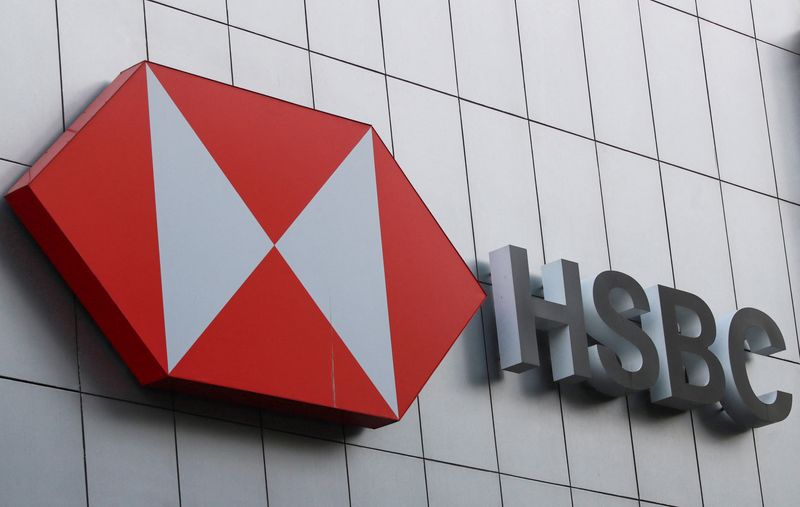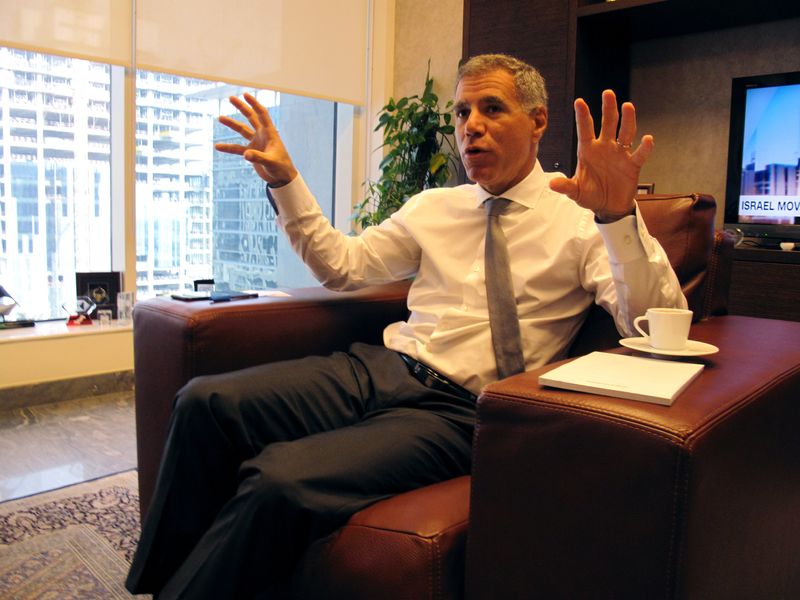By Lawrence White, Selena Li and Sinead Cruise
LONDON/HONG KONG (Reuters) - Delivering growth amid falling interest rates, navigating tensions between China and the West, and managing HSBC's exposure to China's lingering bad loans crisis will be among the top challenges facing the bank's new CEO Georges Elhedery.
Outgoing boss Noel Quinn addressed many long-standing problems at Europe's biggest bank, selling underperforming businesses in markets such as Canada and France, and slashing its retail banking business in markets where it lacked scale.
But his five-year tenure saw HSBC's share price gain just 4%, against a 53% surge in Europe's benchmark STOXX banking sector index, and a 15% increase in a UK sector index.
Here are Elhedery's five biggest challenges, according to analysts, investors and insiders.
FALLING INTEREST RATES
Two years of interest rate hikes as the world battled inflation helped to propel HSBC to record profit of $30 billion in 2023, as it makes more money when it can lend at higher rates than it pays on its $1.7 trillion deposit base.
HSBC's net interest income, which accounts for half its revenues, rose $5.4 billion in 2023 to nearly $36 billion. But it is expected to fall back to $33 billion this year and next, according analyst forecasts, as central banks cut rates.
"For HSBC, like many banks, a key reason for the sub-par valuation is an inherent scepticism around the sustainability of earnings as interest rates come off their peak," said Benjie Creelan Sandford, financial equity portfolio manager at Algebris Investments, which holds HSBC shares.
"Demonstrating the alternative growth levers that can be pulled will be key to support a re-rating going forward."
GROWTH PLANS UNPROVEN
A fall in interest-based income would raise the pressure on HSBC to deliver growth from fee-based products such as wealth management.
The bank's net new invested assets increased by 6% in 2023 to $84 billion, with a 7% gain in Asia wealth revenue, its wealth head Nuno Matos said in an investor presentation in June.
The bank has invested billions in raising stakes in insurance and securities joint ventures in China, as well as growing its private banking presence onshore.
It has hired around 1,700 wealth managers in China since 2021 and is on track to meet a target of 3,000 by 2025, executives told Reuters in April.
Despite this, HSBC's wealth and personal banking unit posted an operating loss of $90 million in China last year.
Even as Beijing pursues its "common prosperity" campaign to close the widening gap between the Chinese rich and poor, the wealth pool is expected to grow at a much slower pace.
A plan by HSBC's European chief to target inbound expansion by Asian corporate clients, reported by Reuters in April, is likewise in its early stages.
GEOPOLITICAL TENSIONS
With Hong Kong and Britain accounting for more than half its annual profit, HSBC is highly sensitive to souring relations between China and the West.
It is exploring options to take full control of its Chinese fund management unit, but there are concerns Beijing may stall on approving that unless Sino-U.S. tensions ease.
More broadly, HSBC relies on healthy global trade flows and increased cross-selling between its geographical units, a business model it defended fiercely against calls for a break-up from its biggest shareholder Ping An Asset Management Co.
The Chinese investor still holds an 8.9% stake in the bank and could cause further headaches, even as it weighs reducing that position, according to media reports in May which Ping An denied.
CHINA BAD LOANS
Elhedery will also have to manage HSBC's exposure to China's lingering bad loans crisis, which triggered a shock $3 billion impairment charge last February on the bank's stake in Bank of Communications (BoCom).
Despite some suggestions that China's indebted property sector has bottomed out, house prices fell in May at the fastest pace in nearly a decade.
BoCom's non-performing loan ratio for real estate lending was at 4.49% at the end of 2023, from 2.8% at the end of 2022.
More broadly, a slowing Chinese economy and weaker markets have weighed on HSBC's performance in Asia.
It reported a $24 billion fall in assets across Asian customer accounts in the first quarter of this year, mainly at its legal entity in Hong Kong. The bank said the drop reflected competitive pressures in its commercial, wealth and global markets business, and risk aversion among some customers.
GEOGRAPHICAL FOCUS
HSBC has sold assets in markets such as the United States, France and Canada, shrinking a once globe-spanning empire that led it to market itself as "the world's local bank".
But some think there might be more to do.
"I think it's the question of whether the geographical divestments HSBC has already completed ... are enough for it to maximize its medium-term returns," said Mike Makdad, senior equity analyst at Morningstar.
HSBC's profitability is still highly skewed towards Hong Kong, Makdad said, and the business model of a global bank with retail operations in numerous countries has become more complicated after progressive tightening of global bank capital requirements since the 2008 financial crisis.

"So the question for the new CEO is: what kind of bank should HSBC be so that the combination of parts generates the best synergies?", he said.
HSBC did not immediately respond to a request for comment.
